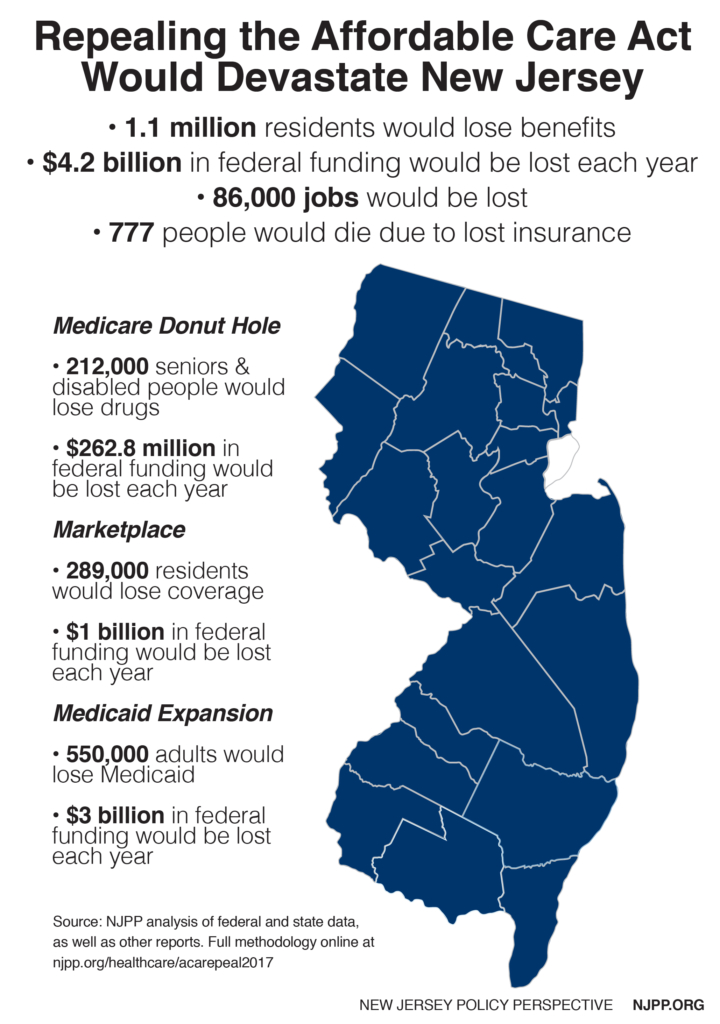To read a PDF version of this report, click here.
 President-elect Donald Trump’s proposal to repeal the Medicaid expansion as part of rolling back most of the Affordable Care Act (ACA) would harm New Jersey far more than most other states, causing over a half million low-income residents to lose health coverage and costing the state about $3 billion a year in federal funds. This would reverse the progress New Jersey has made in reducing the number of residents without insurance while deepening the state’s severe financial and budget crisis. New Jerseyans across the state, as well as hospitals and other health care providers, would be harmed.
President-elect Donald Trump’s proposal to repeal the Medicaid expansion as part of rolling back most of the Affordable Care Act (ACA) would harm New Jersey far more than most other states, causing over a half million low-income residents to lose health coverage and costing the state about $3 billion a year in federal funds. This would reverse the progress New Jersey has made in reducing the number of residents without insurance while deepening the state’s severe financial and budget crisis. New Jerseyans across the state, as well as hospitals and other health care providers, would be harmed.
The option for states to expand Medicaid took effect January 1, 2014 and allows them to raise eligibility to a higher, uniform national level and, for the first time, include adults without children at a much higher federal matching rate to make it easier for states to cover more Americans.
Given the threat the Trump proposal poses to New Jersey, the state’s Congressional delegation must strongly oppose any repeal of the Affordable Care Act, including the Medicaid expansion; Gov. Christie should use his influence to ensure that the expansion stays in place; the legislature should hold hearings and urge Congress to keep the expansion intact; and the state should stay the course and help more uncovered people enroll.
About 10 Percent of New Jersey Adults Would Lose Health Coverage
Repealing the Medicaid expansion would cause about 528,000 adult New Jerseyans – or 10 percent of all non-elderly adults in the state – to lose their health coverage. This is because so many New Jerseyans have benefitted from the Medicaid expansion – far more than originally anticipated. In fact, New Jersey has the eighth highest number of new participants.
Prior to the Affordable Care Act, Medicaid enrollment was decreasing but when the expansion became available, an additional 480,000 New Jerseyans signed up – increasing total enrollment by 37 percent over just three years.
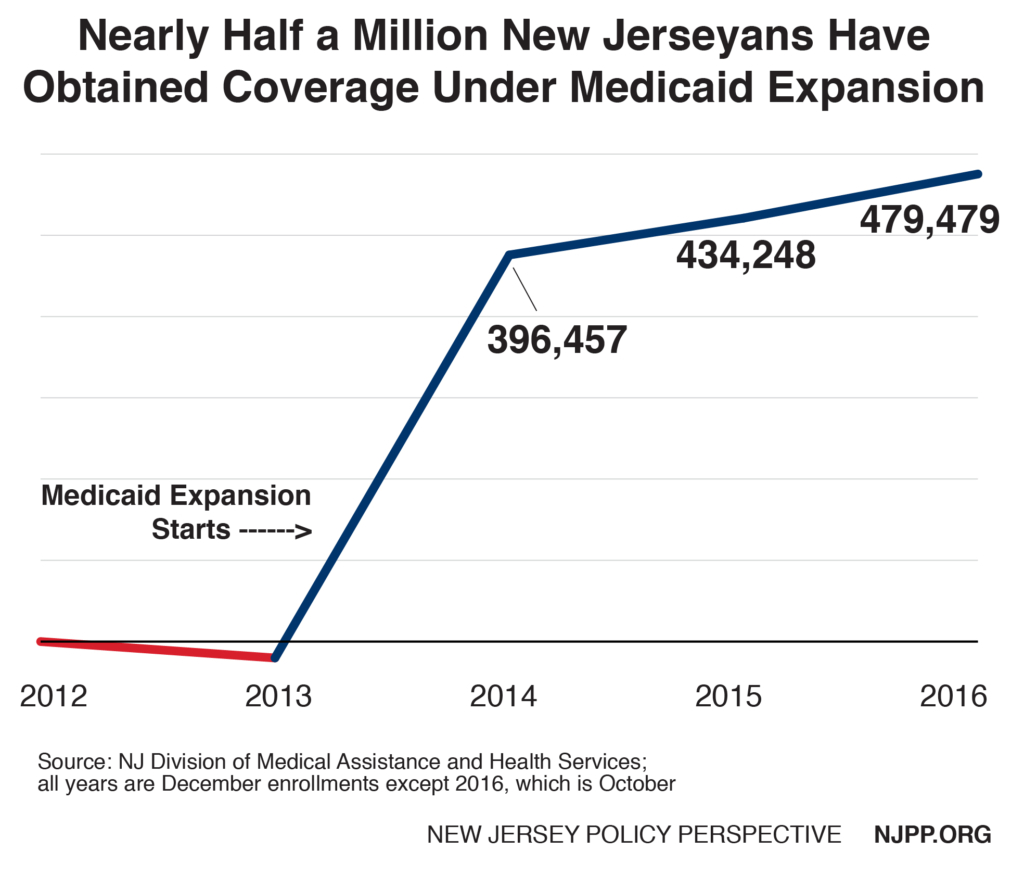
But it’s not just most of these new enrollees who are at risk of losing coverage. Many adults who had coverage in NJ FamilyCare before the Medicaid expansion, are also at risk because waivers that were granted by the federal government to assist them have since expired. In other words, the state could end up with fewer New Jerseyans in Medicaid than it had prior to the Medicaid expansion if it is repealed.
If all of these New Jerseyans lose their health coverage, it would reverse the historic gains the state has made in reducing the number of residents without health insurance. The Medicaid expansion and other parts of the ACA have caused the state’s uninsurance rate to drop by 34 percent in just two years, falling to an unprecedented 8.7 percent in 2015 from 13.2 percent in 2013. Now just 771,000 residents lack insurance, compared to 1,160,000 in 2013.[1]
The Medicaid expansion has helped drive this unprecedented progress in health coverage for New Jerseyans, much more so than the federal health insurance marketplace. More than twice as many New Jerseyans are in the Medicaid expansion than the marketplace; far fewer of them had health insurance prior to the ACA; they have lower incomes and therefore fewer insurance alternatives; and, as mentioned above, an entirely new group of New Jerseyans would become uninsured.
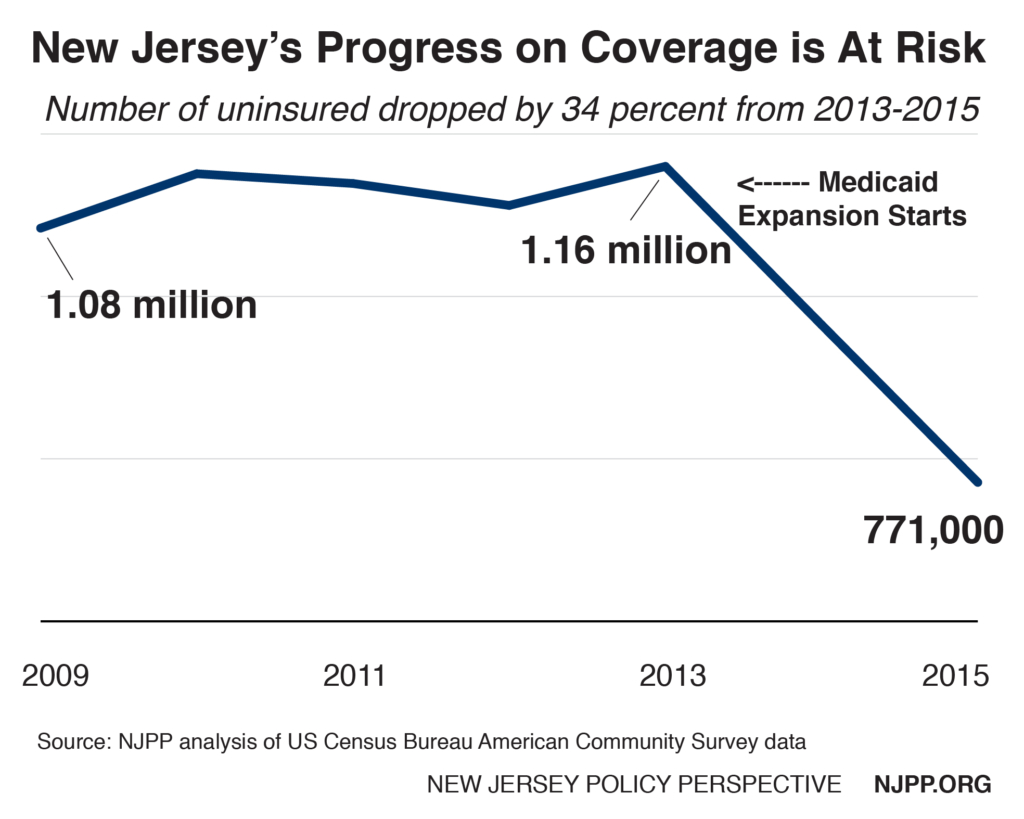
Many At-Risk New Jerseyans Are Low-Paid Workers Trying to Get By in High-Cost New Jersey
Nearly two-thirds of the adults who are at risk of losing coverage under the repeal of the Medicaid expansion are working, or living in households where someone works.[2] These workers are paid very low wages and cannot afford even minimal medical care without assistance.
The Medicaid expansion extended health coverage to individuals up to 138 percent of the federal poverty level, or an approximate annual income of $15,800 for an individual and $23,800 for a single parent with two children. Adults earning this little in New Jersey – the equivalent to between $8.50 and $15 for full-time, year-round work – are struggling every day just to pay for food and housing in a state with one of the highest costs of living in the nation.[3]
These New Jersey residents work in jobs we see every day: they are the servers at our local diner, the teachers at our child care center, the cashiers at the grocery, the salespeople at our favorite department store, our kid’s school bus drivers. In fact, the New Jerseyans in the Medicaid expansion work in nearly 300 different industries. Much of the comprehensive health care they are now able to receive is essential for them to continue to work, such as treatment, which was enhanced in the Medicaid expansion for the growing problems of substance abuse and mental illness.
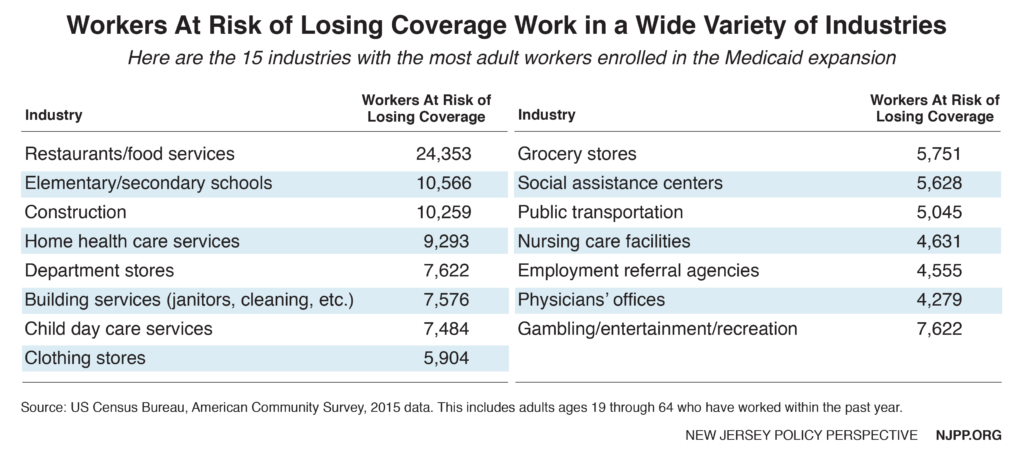
New Jerseyans All Over the State Would Lose Coverage, but the Impact Would Be Most Severe in Urban Counties and Major Cities
Some New Jersey’s counties are among the wealthiest in the nation yet many of their residents would lose Medicaid if Trump’s proposal is adopted. The number of adults losing coverage ranges from 3,100 in Hunterdon County to 67,000 in Essex County. (For a full breakdown, which includes the number of parents at risk and the potential loss of federal funds by county, see the Appendix.)
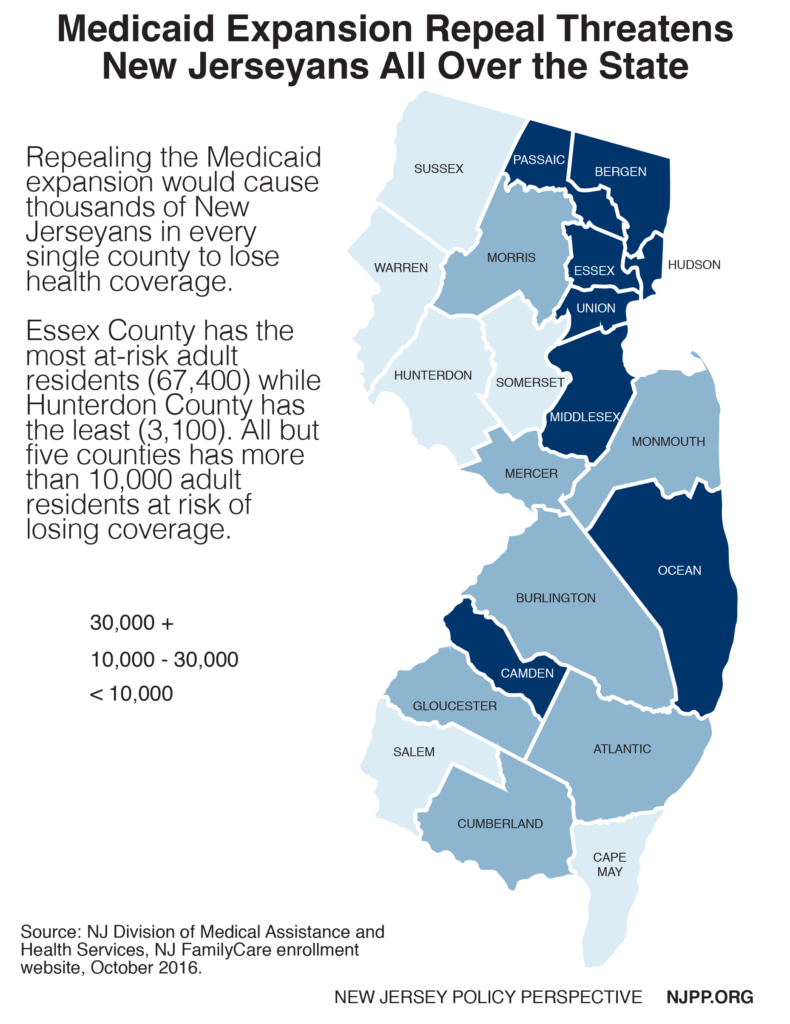
 The dangers posed by repealing the Medicaid expansion should be considered a bipartisan issue because the lack of health care harms Americans regardless of their political party affiliation. Although more New Jerseyans at risk of losing health coverage live in Democratic districts, 145,000 of them live in Republican districts.[4]
The dangers posed by repealing the Medicaid expansion should be considered a bipartisan issue because the lack of health care harms Americans regardless of their political party affiliation. Although more New Jerseyans at risk of losing health coverage live in Democratic districts, 145,000 of them live in Republican districts.[4]
While the damage from repealing the Medicaid expansion would be felt in all parts of the state, it would be felt most keenly in many of New Jersey’s major cities.
A total of 163,000 adults – or about a third of the statewide total – are at risk of losing coverage in ten cities alone. In these cities, between one in three and one in seven adults are at risk. Newark has the most at-risk adults total (36,751), while Camden has the greatest share of at-risk adults (about one in three).

New Jersey Would Suffer its Greatest Loss in Federal Funds Ever, Deepening its Financial Crisis
Repealing the Medicaid expansion would cause New Jersey to lose about $3 billion in federal funds each year starting in 2018 assuming the cuts take effect that year. This loss would total $11 billion over just four years. Such a large loss in federal funds would have what economists call a “multiplier effect,” resulting in a first-year loss of $4.1 billion in economic activity and many jobs, particularly in the health care sector.[5] Since the Medicaid expansion and the marketplace started in 2014, 24,000 health jobs have been added in New Jersey, many of which would be eliminated if the Medicaid expansion is repealed.
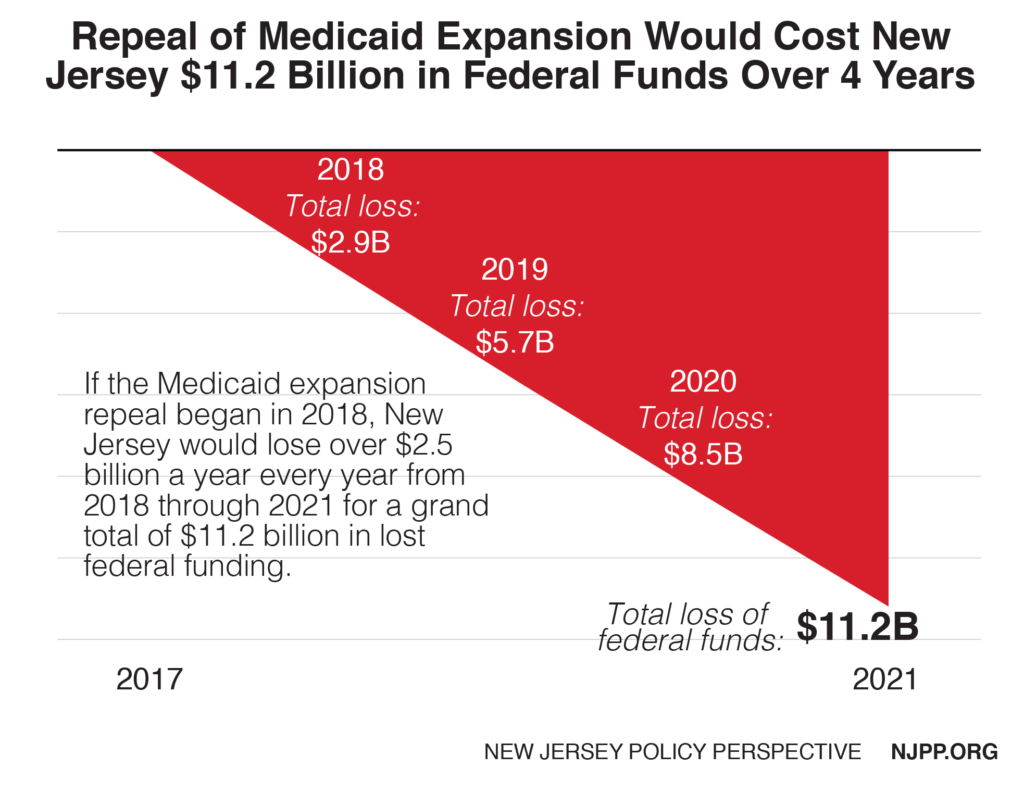
 This loss in federal funding would directly blow a big hole in New Jersey’s budget.
This loss in federal funding would directly blow a big hole in New Jersey’s budget.
While there have been modest state costs due to the Medicaid expansion, on the whole the expansion has saved the state money. New Jersey has already saved $1 billion in the last three years thanks to the expansion, which has been used to balance the chronically unbalanced and underfunded state budget. New Jersey is also projected to save nearly half a billion dollars annually in the future – but that would not happen if the Medicaid expansion is repealed.
The reason for this windfall is that New Jersey was using state funds to help cover 167,000 childless adults and parents prior to the Affordable Care Act; the Medicaid expansion replaced those state funds entirely with federal funds. Prior to the ACA, New Jersey had paid for all the costs for childless adults receiving General Assistance. In addition, under a waiver, the state was responsible for a 35 percent match to obtain 65 percent matching federal funds for parents in NJ FamilyCare, which has since expired.
New Jersey’s finances are already at rock bottom, with the state unable to meet promised obligations, invest in the assets that can grow the state’s economy or ensure a strong safety net. Repeal of the Medicaid expansion would dig this very deep hole even deeper.
Hospitals and Health Care Providers Would Be Significantly Harmed
 Most of the medical services low-income New Jerseyans have received under the Medicaid expansion prevent more expensive hospitalizations. About three-quarters of the funding that is spent for the medical care they receive is for pharmacy, primary care, outpatient and other services that prevent more costly medical conditions and reduce the incidence of hospitalization. With repeal, thousands of primary doctors, specialists and pharmacists would be put in the very tough position of having to tell their patients they no longer can assist them, no matter how serious their condition, or continue to care for them without getting paid.
Most of the medical services low-income New Jerseyans have received under the Medicaid expansion prevent more expensive hospitalizations. About three-quarters of the funding that is spent for the medical care they receive is for pharmacy, primary care, outpatient and other services that prevent more costly medical conditions and reduce the incidence of hospitalization. With repeal, thousands of primary doctors, specialists and pharmacists would be put in the very tough position of having to tell their patients they no longer can assist them, no matter how serious their condition, or continue to care for them without getting paid.
Hospitals would have their own set of major challenges. Under New Jersey law, residents cannot be charged for any emergency and other care in a hospital if their income is below 200 percent of the federal poverty level (residents between 200 to 300 percent of the federal poverty level also get some help but pay a sliding-scale fee). To help ensure that hospitals were able to provide this care, the state has historically had a line item in the budget for “charity care,” which is half paid for with state funds and half federal, and is distributed to all acute-care hospitals in the state.
But in the past few years, New Jersey has cut this charity care funding by more than half (to $302 million by the 2017 budget from $650 million in the 2015 budget). The Christie administration’s rationale was that hospitals would need less funding for charity care since more New Jerseyans had coverage through the Medicaid expansion (this was a bit misleading since the state never fully compensated the hospitals for their charity care in the first place).
If the Medicaid expansion is repealed, many of the newly uninsured would return to the hospital emergency rooms for their care even though charity care funds to serve them would no longer be sufficient. State policymakers would have to either replace these funds – at the very same time budget pressures would increase due to the reduction in federal Medicaid funds – or put the financial solvency of many of these hospitals in jeopardy. New Jersey’s hospitals employed 118,000 people and paid out $8 billion in salaries in 2014, and are often the largest employer in the towns in which they are located.[6] Undermining hospital finances would also harm local economies with immediate and consequentially negative ripple effects.
New Jersey’s Leaders Must Act to Preserve Coverage
1. New Jersey’s Congressional delegation must strongly oppose the repeal of the Affordable Care Act, including the Medicaid expansion.
Every Senator and member of the House that represents New Jersey should fight to preserve the Medicaid expansion for the sake of the tens of thousands of constituents in every Congressional district whose coverage is at stake. It will be particularly important that New Jersey’s House Republicans take the lead on this, since they are in the majority party in Congress.
At the very least, the Congressional delegation needs to oppose repeal until a suitable replacement is identified. Congressional leaders and President-elect Trump have said that they intend to repeal the Affordable Care Act first and worry about how to replace it later, before the repeal becomes effective (possibly in two years). The problem is these opponents of the ACA have yet to come up with a clear and adequate replacement. All of their suggestions so far, such as Health Savings Accounts, high-risk insurance pools and tax credits for premiums, would only benefit higher-income Americans and would be of virtually no help for the poorest Americans who benefit from the Medicaid expansion.
2. Gov. Christie should use his influence to ensure that the expansion stays in place.
While its unclear exactly how much influence Gov. Christie has with the President-elect, the governor was one of Trump’s close advisors during the campaign and a big supporter. This, and his embrace of the Medicaid expansion despite overall opposition to the ACA, makes Gov. Christie well-suited to highlight the special significance of the Medicaid expansion and help convince both the Trump administration and Congress to not repeal it.
3. The New Jersey legislature should hold hearings and urge Congress to maintain the Medicaid expansion.
The legislature should provide an opportunity for the Christie administration to explain how the state could respond to the possible repeal of the Medicaid expansion and/or how they will fight it in Congress. Since the governor has advocated for the repeal of the ACA, it is important that his administration provide an alternative that the state can implement to avoid the loss of health coverage to a half-million New Jerseyans. It will also be critical to understand how New Jersey can respond to the elimination of budget savings resulting from the Medicaid expansion and how the state can replace the cutbacks in charity care to avoid the possible closing of some hospitals.
4. The state should not start winding down the Medicaid expansion in anticipation of repeal.
New Jersey officials should stay the course on the Medicaid expansion and continue enrolling residents who need coverage, even with the threat of repeal on the horizon. It would be irresponsible for the state to prevent low-income residents from obtaining coverage – if even for a short time – or to turn down billions of dollars in federal funds while they are still available.
Appendix
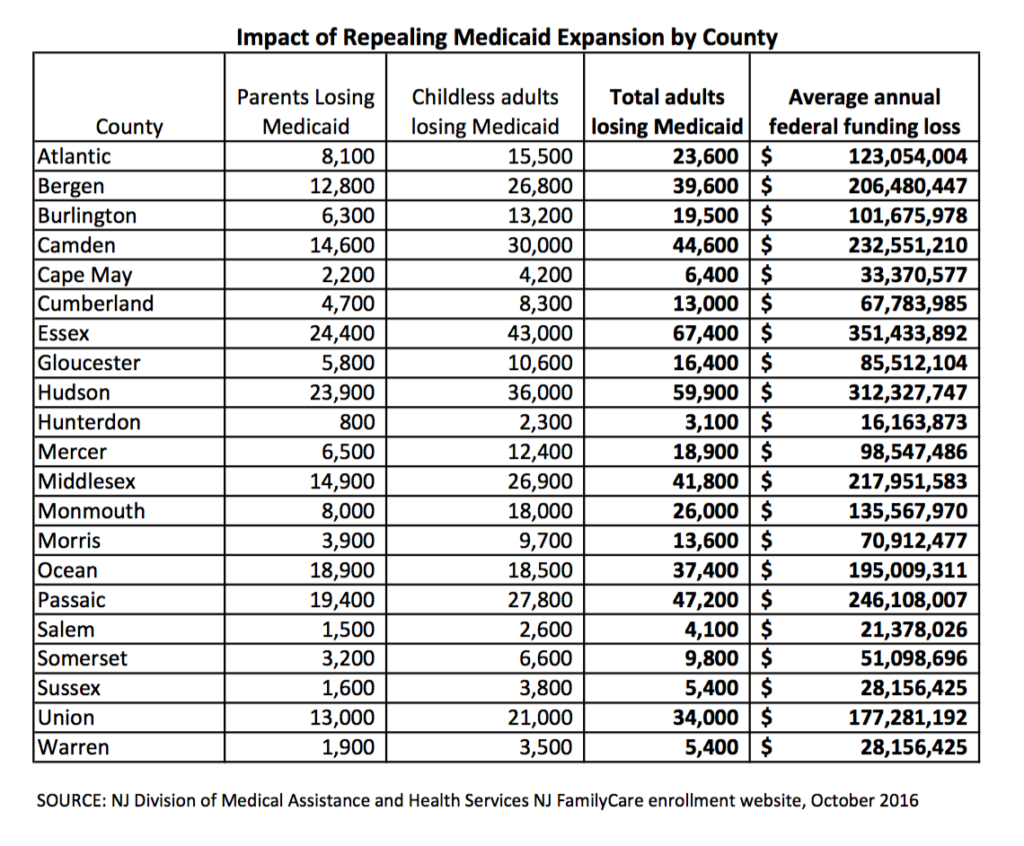
Endnotes
[1] NJPP analysis of US Census Bureau, American Community Survey, 2015.
[2]| The Henry J. Kaiser Family Foundation, The Coverage Gap: Uninsured Poor Adults in States that Do Not Expand Medicaid, October 2016.
[3] Missouri Economic Research and Information Center, Composite Cost of Living, Third Quarter 2016.
[4] We count the fifth Congressional district – where a Democrat defeated a Republican on election day – as Democratic here, since we are looking at a proposal that could be taken up by the next Congress, not the current Congress.
[5] The methodology for converting federal funds received to economic activity and jobs was based on a report published by Families USA, New Jersey’s Economy Will Benefit from Expanding Medicaid, which contracted with the Regional Economic Model, Inc. (REMI) to estimate the impact of expanding Medicaid in New Jersey. REMI used its 51-Region PI+ Model, which includes 70 industry sectors for the Families USA report. The same ratio of federal funds to economic activity and jobs that was used in the above report was also used in this report.
[6] New Jersey Hospital Association, 2015 Economic Impact Report.

